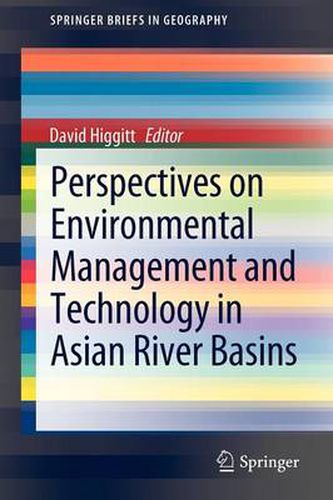Readings Newsletter
Become a Readings Member to make your shopping experience even easier.
Sign in or sign up for free!
You’re not far away from qualifying for FREE standard shipping within Australia
You’ve qualified for FREE standard shipping within Australia
The cart is loading…






This title is printed to order. This book may have been self-published. If so, we cannot guarantee the quality of the content. In the main most books will have gone through the editing process however some may not. We therefore suggest that you be aware of this before ordering this book. If in doubt check either the author or publisher’s details as we are unable to accept any returns unless they are faulty. Please contact us if you have any questions.
Asian river basins are undergoing rapid transformation. This volume considers the implications of the environmental change-development nexus for water management, river health and hazard awareness. As Biswas and Tortajada (2011) have recently commented, water management in Asia will likely change more in the next twenty years than in the last 2000 years. Critical environmental trends include decreasing flows of water and sediment due to dam construction and increased water extraction, land use change (especially forest removal), encroachment and degradation of floodplain and wetland environments, increased water demand and concerns about water security, urban expansion and associated pollution of rivers and contamination of groundwater reserves. These challenges are being reframed by new approaches to water management which represent a transition from engineering-dominated approaches towards integrated water management, from technology transfer to adaptive technologies. The volume comprises an introduction and five chapters. Brierley and Callum reframe approaches to river repair within emerging theories of in ecology and earth science which regard nature as a complex adaptive system replete with inherent uncertainties. These ideas are mirrored in the four case study chapters which deal with water governance in the Mekong Basin (Hirsch); hybrid adoption of water resource technologies in India (Barbanente et al.); determination of sediment dynamics in Java Rijsdijk); and ecological conservation imperatives in the headwaters of the Yellow, Yangtze and Mekong rivers in western China (Li et al.).
$9.00 standard shipping within Australia
FREE standard shipping within Australia for orders over $100.00
Express & International shipping calculated at checkout
This title is printed to order. This book may have been self-published. If so, we cannot guarantee the quality of the content. In the main most books will have gone through the editing process however some may not. We therefore suggest that you be aware of this before ordering this book. If in doubt check either the author or publisher’s details as we are unable to accept any returns unless they are faulty. Please contact us if you have any questions.
Asian river basins are undergoing rapid transformation. This volume considers the implications of the environmental change-development nexus for water management, river health and hazard awareness. As Biswas and Tortajada (2011) have recently commented, water management in Asia will likely change more in the next twenty years than in the last 2000 years. Critical environmental trends include decreasing flows of water and sediment due to dam construction and increased water extraction, land use change (especially forest removal), encroachment and degradation of floodplain and wetland environments, increased water demand and concerns about water security, urban expansion and associated pollution of rivers and contamination of groundwater reserves. These challenges are being reframed by new approaches to water management which represent a transition from engineering-dominated approaches towards integrated water management, from technology transfer to adaptive technologies. The volume comprises an introduction and five chapters. Brierley and Callum reframe approaches to river repair within emerging theories of in ecology and earth science which regard nature as a complex adaptive system replete with inherent uncertainties. These ideas are mirrored in the four case study chapters which deal with water governance in the Mekong Basin (Hirsch); hybrid adoption of water resource technologies in India (Barbanente et al.); determination of sediment dynamics in Java Rijsdijk); and ecological conservation imperatives in the headwaters of the Yellow, Yangtze and Mekong rivers in western China (Li et al.).